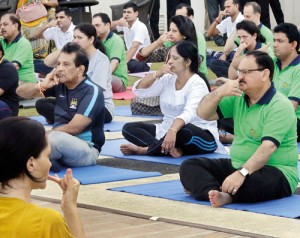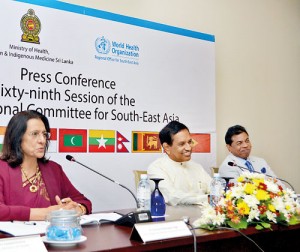News
Physical activity takes centre stage at Intl health conference
View(s):South East Asian Health Ministers practise what is preached
By Kumudini Hettiarachchi
With healthy lifestyles high on the agenda as an essential and simple tool in combating the burgeoning threat of non-communicable diseases (NCDs), Health Ministers from 11 South-East Asian nations including Sri Lanka meeting in Colombo left the podium to engage in physical activity.

A yoga session for both mind and body: Indian Health Minister J.P. Nadda, Health Minister Dr. Rajitha Senaratne and others. Pic by M.A. Pushpa Kumara
Providing proof that they are in fact practising what they preach, the day after the inauguration of the 69th Regional Committee (RC) Meeting of the South-East Asia Region (SEAR) of the World Health Organisation (WHO), President Maithripala Sirisena, Health Minister Dr. Rajitha Senaratne, WHO Director-General Dr. Margaret Chan and WHO SEAR Regional Director Dr. Poonam Khetrapal Singh engaged in an exercise programme early morning on Tuesday.
It was a yoga session in different poses the next day, Wednesday, with Indian Health Minister Jagat Prakash Nadda in the lead and on Thursday Thai boxing by Thai Public Health Minister Professor Emeritus Piyasakol Sakolsatayadorn.
Such exercise sessions — sending a clear message to a region with the rising spectre of NCDs which is causing 8.5 million deaths — were firsts in the history of the RC Meeting, the Sunday Times understands.
And among the two main items discussed at the ministerial roundtables was the serious issue of NCDs, stressed Health Minister Dr. Senaratne at a noon media briefing on Friday as the five-day RC Meeting drew to a close. The harsh reality of NCDs is that not only is it a global phenomenon, but right here in Sri Lanka a shocking 70% of hospital deaths are due to NCDs, he said, pointing out, “We have controlled CDs and now the challenge is NCDs.”

SEAR Regional Director Dr. Poonam Khetrapal Singh, Health Minister Dr. Rajitha Senaratne and Health Services Director-General Dr. Palitha Mahipala at the noon media briefing on Friday. Pic by Anuradha Bandara
While all the Health Ministers had expressed concern over the burden of NCDs which include cardiovascular diseases, cancers, diabetes and chronic respiratory diseases, they had pledged to undertake targeted screening for early diagnosis and increased health guidance and counselling to promote healthy choices and self-care.
Dr. Senaratne pointed out that Sri Lanka already has 842 healthy lifestyles centres across the country and 906 well-women clinics which in addition to the usual screening for NCDs will also screen for breast and cervical cancers. “By 2018, we are hoping to make such checks compulsory.”
The other issue the RC Meeting was “sitting down to complete” by Friday was how the SEAR countries could achieve the Sustainable Development Goals (SDGs) on health, he said. The Strategic Action Plan to reduce the double burden of malnutrition in the SEAR region from 2016-2025 developed by the WHO in consultation with the member-countries was also adopted at the RC Meeting. It serves as an advocacy and reference tool for these countries to ensure that national interventions are comprehensive and evidence-based.
Of particular interest to Sri Lanka, meanwhile, was the focus on migrant health, which had been put on the agenda at the RC Meeting at the country’s request. During discussions on migrant health the member-countries had shared experiences and also turned the spotlight on the potential for the spread of infectious diseases and anti-microbial resistance.
On Monday, the RC Meeting was inaugurated by Prime Minister Ranil Wickremesinghe in a ceremony that ran like clockwork at the tastefully-decorated Nelum Pokuna in Colombo, with nearly a thousand participants including high-level WHO representation.
The WHO representation at the RC Meeting was “huge”, with 10 members including Director-General Dr. Margaret Chan flying in from WHO Headquarters in Geneva and 53 from the SEAR Regional Office in Delhi. The 11 member-countries of SEAR are Sri Lanka, Bangladesh, Bhutan, Democratic People’s Republic (DPR) of Korea, India, Indonesia, the Maldives, Myanmar, Nepal, Thailand and Timor-Leste.
The 70th RC Meeting is to be held in the Maldives next year (2017); the 71st in Delhi, India, where the SEAR Regional Office is based in 2018; and the 72nd in DPR Korea in 2019.
| Elimination of mother-child HIV spread next The elimination of HIV transmission from mother to child is the next milestone for Sri Lanka that Regional Director Dr. Poonam Khetrapal Singh is “pushing” for, to be achieved next year or by 2018 the latest. This is while she heaped laurels on Sri Lanka for the elimination of malaria, lymphatic filariasis and maternal and neonatal tetanus and having maternal and infant mortality rates on par with some of the developed countries. Sri Lanka’s latest public health achievement in eliminating malaria was certified by the WHO at the RC Meeting, while President Maithripala Sirisena was conferred the ‘Excellence in Public Health’ Award for “his remarkable and sustained role in the public health gains of his country”. President Sirisena was bestowed this honour for strengthening the health system and services and making commendable contributions to tobacco control, drugs regulation, health of migrants and control of chronic kidney disease. Dr. Khetrapal Singh, in an interview with the Sunday Times, revisited her ‘flagship priority areas’ which she has set her heart on resolving in the region — containing NCDs; measles elimination, reduction in maternal and child mortality, universal health coverage, tackling neglected tropical diseases, combating anti-microbial resistance and not only response to emergencies but also preparedness. Having paid an unscheduled visit on Thursday to the nearly 500-bed Castle Street Hospital for Women in Colombo at which 16,000 deliveries are performed, Dr. Khetrapal Singh who was the Health Secretary of Punjab before she took up her WHO duties, commended the hospital for the service it was rendering to Sri Lankan women. | |
| Strengthening health systems: Thrust of Colombo declaration The main thrust of the “landmark” Colombo Declaration is the strengthening of health systems to accelerate the delivery of services at primary health care level to prevent non-communicable diseases (NCDs), said SEAR Regional Director Dr. Poonam Khetrapal Singh. “While it is important to prevent NCDs, those who are at risk of getting NCDs should have all opportunities to access screening as well as treatment,” she said, giving out a gentle reminder that the battle against NCDs cannot be waged solely by the authorities. The onus of preventing NCDs also lies with each and every individual. Even if someone is having NCDs, keeping to the treatment schedule is also the responsibility of that person. The risk factors for NCDs are tobacco, alcohol, an unhealthy diet and lack of physical activity.
|

